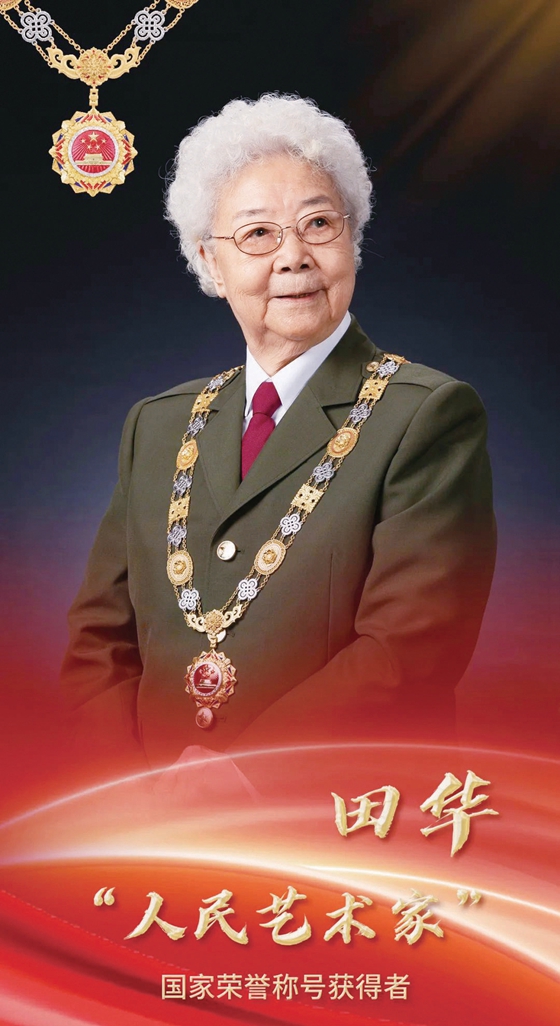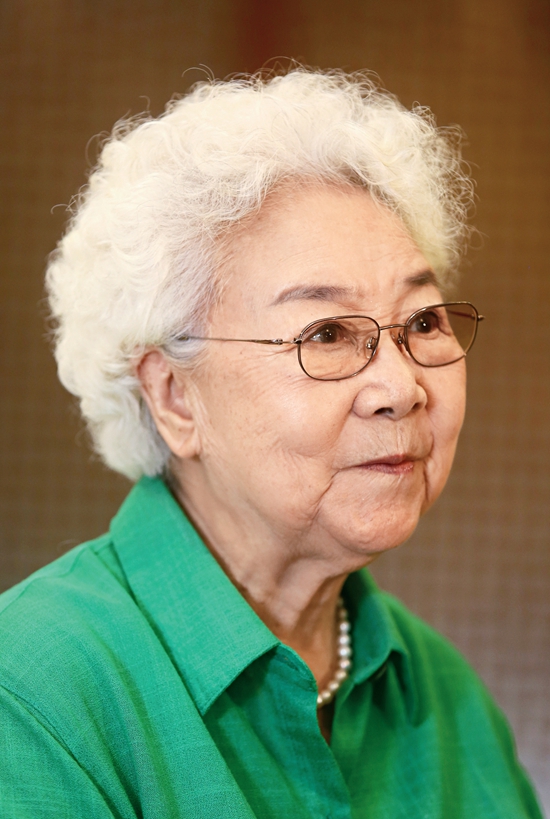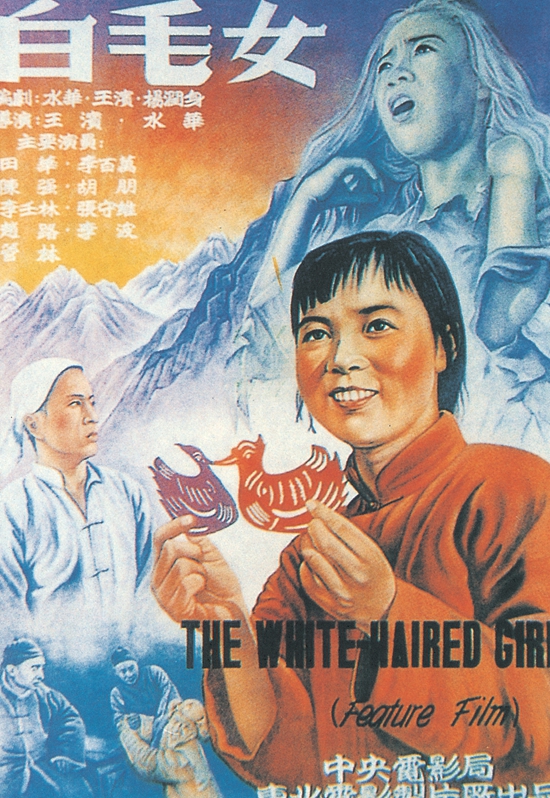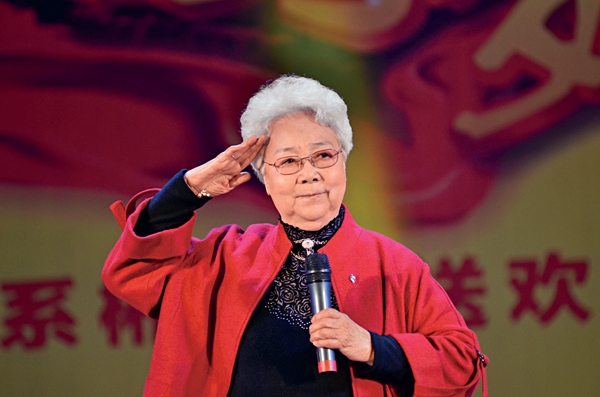Tian Hua: 'I Am the Party's Daughter'

Tian was born into a poor family, in Tangxian County, North China's Hebei Province, in 1928. Her life changed in 1940, when she was 12 and still using the name Liu Tianhua. She saw a play, for the first time, in a neighboring village. Captivated, the next day she asked if she could join the troupe. She was accepted and given a stage name, Tian Hua, which she has used ever since, and which eventually became a household name in China.

Respected Actress
The play Tian had watched that fateful day depicted how the Chinese people were resisting Japanese aggression to save their nation. It was staged by the Eighth Route Army's Jin-Cha-Ji Border Region's Anti-Enemy Drama Troupe, a revolutionary troupe that operated under a military force led by the CPC. In 1944, four years after she joined the troupe, the 16-year-old Tian became a CPC member.
Tian found artistic enlightenment as a member of the troupe. She repeated vocalization exercises, practiced the splits, corrected her Mandarin pronunciation, learned to sing, rehearsed dances, and eventually performed in dramas. Given her talent and hard work, Tian progressed rapidly within the troupe, and she soon became a popular actress. She toured with the troupe, which performed across China to boost the morale of residents and soldiers during the Chinese People's War of Resistance Against Japanese Aggression (1931-1945) and the War of Liberation (1946-1949).
In 1949, Tian reached a turning point in her career. Northeast Film Studio was preparing to shoot a film version of the opera, The White-Haired Girl, and the director was poaching actors from across the country. The story, set in the countryside in North China during the Chinese People's War of Resistance Against Japanese Aggression, revolved around the life of Xi'er, a young girl from a humble background. After her father was killed by a ruthless and greedy debt collector, Xi'er was forced to flee and hide in the mountains. Due to the harsh conditions, and her prolonged malnutrition, she lost her youthful vigor, and her hair turned white. The story depicted her struggle and eventual redemption with the establishment of a new society, which allowed her to resume living a normal life.
 |
| The White-Haired Girl film poster |
Given her rich experiences as a performer, and as a rural resident of China, Tian was eventually offered the role of Xi'er. To study for the role, Tian moved to Pingshan County, in Hebei Province, where she immersed herself deep in rural life. She lived, worked and ate with local farmers, and she experienced all aspects of rural life firsthand. She incorporated those experiences with her childhood experiences, and with her deep understanding of the role, into the performance, and she created a lifelike image of Xi'er. Tian won widespread acclaim for her performance, which helped establish her status within China's film and television industry.
Since then, Tian has portrayed various iconic Chinese characters on the silver screen, including a communist woman, who sacrificed her life for the Party's cause, in The Daughter of the Party. That role solidified Tian's reputation as an actress capable of embodying strong, heroic figures. Tian was one of the most popular actresses at that time, and she has remained one of China's most enduring actresses. Many Chinese, both fans and industry insiders, say Tian's acting has had a lasting impact on China's film industry.

People's Artist
Since her retirement, in 1990, Tian has held true to her belief in the importance of serving the people and the soldiers, and she has devoted considerable time to visiting with and performing for China's troops. She has never turned down a request to perform for the troops on holidays or important events, and she has always given freely of her time to charities. "I would dedicate my entire life to serving the people and the soldiers," she once said.
Since 2008, several of Tian's relatives have fallen ill. Four of her relatives were battling cancer, and Tian had to cover their extensive medical expenses. Facing such difficulties, Tian, then in her 80s, showed extraordinary strength and dedication and made a comeback, starring in various film and television dramas.
In 2016, a pharmaceutical company wanted Tian to star in its advertising campaign. The company offered her two million yuan (US $281,690). Tian declined the offer without hesitation. She had never appeared in commercials, and she worried doing so, especially for a pharmaceutical company, could mislead patients and their families. "I really needed money, but not money coming in that way. I couldn't allow audiences to feel 'the daughter of the Party' valued only money," she said. Her decision clearly reflected her professional ethics, and her sense of social responsibility as an artist.
Tian has received many awards and honors throughout her career, including the Lifetime Achievement Award, during the 19th China Golden Rooster and Hundred Flowers Film Festival, in 2010.
Tian's life and career are testaments to her tenacity, perseverance and commitment to art. From a poor girl to an internationally renowned actress, and even in the face of family changes in later years, Tian has consistently demonstrated her lifelong dedication to art, the Party, and the country.
This year, on the occasion of the 75th anniversary of the founding of the PRC, Tian was awarded the national honorary title of People's Artist. She said, "I feel grateful for our great country, and for the people of the country. They cultivated me. Without them, there would be no me — the 97-year-old Tian Hua."
Photos from Xinhua and VCG
(Women of China English Monthly October 2024)
Editor: Wang Shasha
Please understand that womenofchina.cn,a non-profit, information-communication website, cannot reach every writer before using articles and images. For copyright issues, please contact us by emailing: website@womenofchina.cn. The articles published and opinions expressed on this website represent the opinions of writers and are not necessarily shared by womenofchina.cn.








.jpg)

 WeChat
WeChat Weibo
Weibo 京公网安备 11010102004314号
京公网安备 11010102004314号